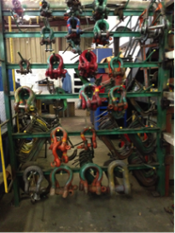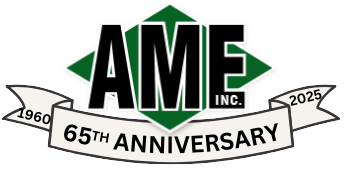 I recall as a child the coolest place to be left alone for hours on end was the basement of my grandparents’ home. It was where my grandfather had established his “shop.” It was where all things made by hand could be made, where anything broke could be fixed, and where concept became reality; you just had to know where the tools and materials all were stored to get started. He built model planes, cars, boats, shelves, cabinets, soap box cars, rebuilt motors of all kinds, etc. He had the knack for building things that we as industrial contractors all possess at our core and he was highly organized.
I recall as a child the coolest place to be left alone for hours on end was the basement of my grandparents’ home. It was where my grandfather had established his “shop.” It was where all things made by hand could be made, where anything broke could be fixed, and where concept became reality; you just had to know where the tools and materials all were stored to get started. He built model planes, cars, boats, shelves, cabinets, soap box cars, rebuilt motors of all kinds, etc. He had the knack for building things that we as industrial contractors all possess at our core and he was highly organized.
Everything had its place there; bolts of all different sizes were sorted in bins according to size, tools were hung from peg boards on the walls or on shelves and in drawers in their cases with spare bits, blades, etc. alongside them. Things for maintaining the home such as light bulbs, fuses, knobs, plumbing parts, hoses, etc. were in their own area by category and sorted further by application. The floor was always swept clean and trash was never allowed to accumulate … and if it did, it was a clear sign that someone other than the owner had been there. I loved this place; but we had to obey the rules to be allowed here; “put it back where you found it when you are done and if you use the last of anything, tell the boss” (poppa).
Good Housekeeping Creates Efficiency Around the House
Today, as a grown man and an industrial contractor by profession, I have a similar arrangement at my household. My friends and some relatives joke about my shop and how overly organized it is, but it is rather funny how it is the first place they migrate to when they need something to borrow, need to fix something, or need to build something, often even though they have the means to do so at their own home … when asked why, the response is generally “it’s easier at your place.” I know the real reason, my place is organized and you can find everything easily and without wasting hours trying to remember where that next item you need is, so the job at hand gets done in a reasonable amount of time without trips to the local hardware or auto parts store for items you know you have but can’t find.
When it comes to the members of my household, my daughter knows that she has to clean up her room and put her clothes in the hamper and toys in their place so that when my wife or I clean the house and do laundry we can do so efficiently. For myself, I have to put dirty dishes in the dishwasher not the sink, trash has to go out in the can, and clothes in my hampers; separated for whites and colors of course or the boss will be on me. This helps our house run efficiently.
Good Habits for Industrial Contractors Reduce Costs and Lower Costs
This same ethic for organization and cleanliness of the workshop can and should be applied as an industrial contractor to the grander scale projects we do for clients in the manufacturing facilities we work at day in and day out. And, doing so efficiently is necessary, as this translates into real costs.
On every job, the right tooling has to be identified and pulled from the proper storage shelves, loaded into tool boxes for delivery to the site, and set up for crews to work with and out of efficiently. Then it is the responsibility of the crews on the site to put things back where they found them when done with them so that the next time it is needed, it can easily be found; to report to the boss if they used the last of anything; and clean up the trash they generated. If an industrial contractor fails to adhere to these simple rules is very costly and can create unsafe conditions on the site.
When a four-man crew is unable to proceed because they can’t find the matching choker to rig a machine in a two-leg lift because “it’s somewhere around here,” efficiency for the industrial contractor is at a standstill and the cost of all four men’s salary is basically being spent to find the choker that was not put back where it belonged. When someone uses the last bottle of propane and fails to tell the boss and he finds out once the lift truck runs out of fuel, efficiency is again at a standstill, crew salaries are being wasted, and in some cases can be the cause of a dangerous situation should they be in the middle of a lift.
The management of trash, sawdust, concrete dust from anchor holes, cribbing, general construction debris, etc. on a site is often a direct representation of the care taken by those working there to do a top quality job. Each of these are visual hazards, make a site look poorly managed by the industrial contractor, and can be safety hazards when not properly kept in check. They create trip hazards, damage tires on critical equipment when driven over, slow down work progress when in the way of others, etc.
Appearances Matter to Industrial Contractor Customers
Have you ever picked a can of soup off the shelf at the grocery store only to find it was dented and swapped it for one with no dents in it? Why? The contents were exactly the same, made by the same company, often from the same batch. Clients see a dented can when we manage our housekeeping poorly. I could go on and on with examples like this, but the lesson remains same today as it did years ago, good housekeeping and organization on your behalf allows those around you who are working with you and or for you to be more efficient and safe and truly represent your enthusiasm as an industrial contractor for the project at hand.

